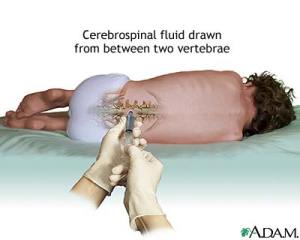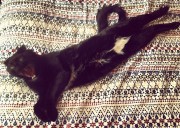Welcome to my personal blog. Here I continue to document some of the adventures that a cancer diagnosis has allowed me to experience. New readers are directed here for part one of that adventure.
 In his 1984 mockumentary “This is Spinal Tap”, director Rob Reiner satirized the world of heavy rock and metal following the band Spinal Tap around the U.S. as they promoted their album “Smell the Glove” down endless backstage corridors and through a series of expiring drummers.
In his 1984 mockumentary “This is Spinal Tap”, director Rob Reiner satirized the world of heavy rock and metal following the band Spinal Tap around the U.S. as they promoted their album “Smell the Glove” down endless backstage corridors and through a series of expiring drummers.
In his 2012 personal experience “This is a spinal tap”, human Robbie M. Cooper had recently begun chemotherapy and was now in Aberdeen Royal Infirmary following the sudden appearance of a number of symptoms which were concerning for someone with a compromised immune system (high temperature, vomiting, sweating, incoherent speech, redness and inflammation in the legs). To rule out meningitis as the cause of the symptoms the medical team decided to perform a spinal tap to extract and analyse some cerebrospinal fluid. Fortunately, having never had a spinal tap before, repeated uses of the words ‘spinal tap’ served only to cause replays of various scenes from the film in Cooper’s mind. Those pleasant associations were soon to be updated, however, by the fact that a man in a nearby bed was also to be given a spinal tap and he was next in the queue. Although various methods were employed to try and maintain the patient’s privacy during the procedure, they had limited efficacy. In short, Cooper (that’s me) could see and hear enough detail to have a very firm impression of what it might be like to have a spinal tap of his very own.

In this example the skin on the lower back is removed to provide easier access for the medical professional.
It goes something like this: the aim of the procedure is first calmly explained to the patient. Then it is pointed out that some patients may experience a certain amount of discomfort during the procedure. OK? OK. The patient is then told that local anaesthesia is provided to alleviate the pain so really the hope is he shouldn’t feel a thing. OK? OK. The patient is then asked to lie on his side and local anaesthesia is injected into the lower back, “Sharp scratch OK? OK”. Then a rather larger needle than the last is inserted in between particular vertebrae in the lower back. OK?
It is at this point that the patient started screaming (and I choose the word ‘screaming’ carefully). Screaming volume? Eleven. After two more attempts at inserting the needle into the spinal column and two more pained vocalisations up at eleven the man pleads for them to stop, which they do reluctantly having not completed their procedure. What I learnt from watching this unfortunate man having a spinal tap was that I didn’t want to be next in line to have a spinal tap!

Question: Why don’t you just make ten louder and make ten be the top number and make that a little louder?
Answer: These go to eleven.
And then it was my turn. In the event, perhaps because they had already taken out all of their frustration on the last guy, I genuinely didn’t feel a thing. The fluid was removed and I suffered no ill effects. That is until a day later when having shaken off the aforementioned symptoms (I’ll come back to that below) and been given the all clear at the hospital, driving back to my mother’s home in Aberdeenshire I developed a severe headache the like of which I had not previously experienced. Another day in bed with this headache and a new doctor diagnoses the cause to be the spinal tap itself: in a minority of lucky patients the cerebrospinal fluid can continue to leak out of the extraction site causing what is known as a low-pressure headache, the remedy being to lie completely flat on your back and consume high quantities of caffeine (in my case for a further five days).
This episode took place in early December, just before the beginning of my third, and what would turn out to be my final (for now), cycle of chemotherapy. I am in the fortunate position that I have cancer on the surface of my skin so that a visual inspection of the area can determine whether or not the drugs were being effective. They weren’t. Not only that, the drugs (Gemcytibine and Cysplatin) made me nauseous, fatigued and increasingly despondent as the sessions went on. I can report that chemotherapy was a struggle. This is even despite my claim at the end of my last blog post that I intended to remain “unremittingly, and unapologetically positive.” I really tried.
The lack of progress with the chemotherapy meant a return to the electron therapy that I also mentioned in blog post 1. Here the principle is to fire electrons at the skin and the cancer cells should be more compromised by these electrons than the regular cells. In my case, despite having early positive signs that this technique would deliver some good, repeated sessions in January and early February did little to help.
On top of the disappointing response to the treatments I was getting increasingly frequent episodes of thrombophlebitis. This is what the medical professionals finally decided was responsible for my hospital admission that led to the spinal tap described above. Basically, because of the cancer, my body’s immune system is all ‘out of whack’ and this leads me to get the kind of systemic response I described above along with the main symptom of inflammation in the veineous system of my legs which lasts 5-6 days per episode.
During another particularly difficult episode of phlebitis I was hospitalised and spent my first nights in an actual cancer ward. If you are ever feeling too positive about life and want to bring yourself down a little then I warmly recommend a few nights in a cancer ward. In my room there were four men including myself. The three others were all avid football fans and since I have no interest in football (a fact that seemed to genuinely shock one of the men) I was quickly deemed unworthy of inclusion in all general chat (perhaps also evidence that academics have poor social skills). That is until the cancer chat started. One man in particular (an older gentleman with late stage oesophageal cancer) was very keen to know everyone’s story and give his opinion. For example he told the man in the bed next to me (a man of about 60 years with newly discovered but advanced prostate cancer) that if he was going to have radiotherapy (which he was), he would have to have (and forgive my attempt at an accent)…”you ken that bit that hangs doon fae the back of your throat? Aye well, first they strip that right oot, nae messing”. The receipt of this information clearly caused Mr Prostate Cancer a certain amount of distress. I felt it was important to interject at this point to state that due to the very different nature and locations of the two cancers, it was highly unlikely that Mr Prostate Cancer would have to have that bit removed from the back of his throat. For my troubles I was threatened with a punch on the nose if I continued to suggest Mr Oesophageal Cancer was a liar. Even though I knew that this was a fight I could actually win if I wanted to ‘step up’, not least because Mr Oesophageal Cancer was bed-bound, I instead decided to reject the physical conflict and calmly reassured Mr Prostate Cancer that he should talk to his Doctor if he was worried.
This event highlights the degree to which fear and uncertainty are huge parts of a cancer diagnosis. As I touched on in my first blog, one of the issues that can be difficult to get your head around is prognosis: that is the issue of how the cancer is going to change your future. I am now six months on from my first blog and I know now that the rare and aggressive cancer I am dealing with (anal adenocarcinoma) is resistant to all the therapies that have so far been thrown at it (laser surgery, chemotherapy, electron therapy). I know that it is continuing to spread on my skin, and that in order to get the increasing levels of pain I was experiencing under control I spent three weeks in Edinburgh’s wonderful Marie Curie Hospice. Overall, you could say it is becoming more challenging.
On the positive side I came out of the hospice with much better pain control. Furthermore, and really importantly, my most recent scan (three weeks ago) again showed no signs of cancer in my internal organs. So, although it still spreads, it has not yet got it’s hooks into my vitals, as far as we can see.
After the clear scan I was given two choices in terms of active treatment: 1) A different and more aggressive chemotherapy regime with a modest chance of making any difference given the lack of success from the first choice chemotherapy (remember, given the rare nature of the disease all choices are best guesses from the doctors). Or 2) Aggressive surgery to remove as much of the diseased skin as possible and replace it with skin grafts in an operation that was described to me as ‘heroic’. There is no anticipation that this will remove all the cancer, but the hope would be that taking the bulk of the cancer away should reduce both pain, and episodes of thrombophlebitis.
Given the previous negative chemotherapy experience and the fact that the surgery feels more proactive I have decided to go for the surgical option. And so tonight (Tuesday 7th May) I am being admitted for an operation which will take place tomorrow. I expect to be in hospital for at least two weeks. I put my trust in the hands of the surgeons.
The last few things: First, if you want to learn more about cancer then I thoroughly recommend the Macmillan website. There is so much excellent information there. Second, in my next blog I hope to give details of a series of concerts that will be taking place across Scotland in September in order to raise money for the Marie Curie Hospice. Finally, if you want to personally give me and my wife some financial support during this time my good friend Jon set up a site where that is possible. I want to give an enormous thanks to all the people who have already so generously donated. It has made life a little bit easier without so much financial stress. I’ll see you all on the other side of the surgery.
Robbie



Best of luck! It sounds as if you are in very competent hands that are giving you the facts as they are, which sounds good. I was very impressed by your wit and courage, here’s wishing you all the best from Spain!
Good luck with the Op, hope the recovery is as smooth as can be xx
Oh Robbie, I am so deeply sorry that you have had to endure so much suffering. I so admire your account and the humour you inject into it. I will be sending positive thoughts to you and I will pray for you .. it is not necessary that you believe in prayer it can still have an effect.
I don’t know how you feel about alternative methods i.e. diet etc. but there are some remarkable stories of complete cancer cure through some of these methods. If you are interested I can find out more from the people here who know more about it.
meanwhile dearest Robbie, my love is with you and I shall think of you tomorrow.
lots of love and a big hug
Ingrid xxxxxxxxxxxxxxxxx
PS. How do i contribute to your fund? Ingridxxxxxxxxxxxxx
Hi Ingrid,
Thank you for your warmth and positivity. It is really very appreciated.!
Just a quick response to say the fund is at the following address:
http://www.gofundme.com/RobbieCooperAwesome
Many thanks,
Robbie
Xxx
Robbie thinking of you.May the powers to be Medical Doctors win the cancer F,A game with your condition. Positive vibes and thoughts for you & Sunny Wishes, Peter
Good luck tomorrow, sending you Jarvie willpower to come out on top, … Besides you need to improve the ward conversation from football,!!! I’m sure with your magnificent strength of attitude you’ll kick both o them outta play!!!… & be celebrating @ the wedding of the year, hope to see you there xxx
I could give you some ready-made football chat to help you avoid any more confrontation with hospital hooligans should a similar situation arise again. But then again, feisty is good. 🙂
I have just lost my dearest friend Cerwyss. You may have known her from playing bass with Macrocosmica. Your blog is poignant and beautifully witty. It made me weep and laugh. Cerwyss was incredibly positive and heroically brave throughout her treatment. I spend time with her boys now and see how every decision she made centred around giving them strength and resilience. Thank you so much for sharing this story. I do hope you continue to write. I will support the upcoming fundraiser in honour of your fabulous spirit. Louise.
Robbie, weird question: have you heard of cannabis/hemp oil?
In what context?
As an alternative treatment.
Not really. What have you heard/read?
Somewhat cheesy video but this is the most popular video on it: